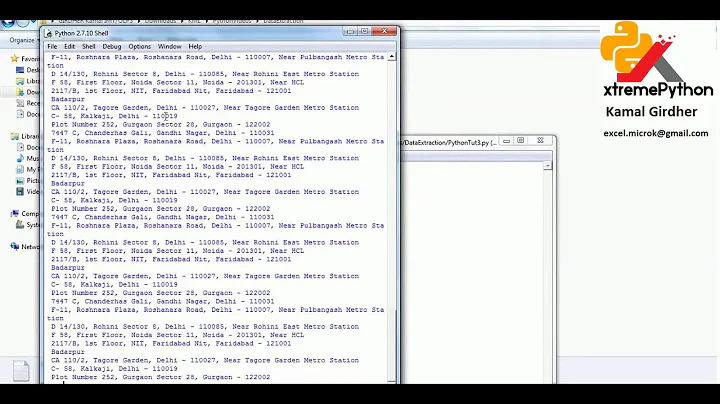Parse key value pairs in a text file
Solution 1
I suggest storing the values in a dictionary instead of in separate local variables:
myvars = {}
with open("namelist.txt") as myfile:
for line in myfile:
name, var = line.partition("=")[::2]
myvars[name.strip()] = float(var)
Now access them as myvars["var1"]. If the names are all valid python variable names, you can put this below:
names = type("Names", [object], myvars)
and access the values as e.g. names.var1.
Solution 2
I personally solved this by creating a .py file that just contains all the parameters as variables - then did:
include PARAMETERS.py
in the program modules that need the parameters.
It's a bit ugly, but VERY simple and easy to work with.
Solution 3
Dict comprehensions (PEP 274) can be used for a shorter expression (60 characters):
d = {k:float(v) for k, v in (l.split('=') for l in open(f))}
EDIT: shortened from 72 to 60 characters thanks to @jmb suggestion (avoid .readlines()).
Solution 4
As @kev suggests, the configparser module is the way to go.
However in some scenarios (a bit ugly, I admit) but very simple and effective way to do to this is to rename myfile.txt to myfile.py and do a from myfile import * (after you fix the typo var 0 -> var0)
However, this is very insecure, so if the file is from an external source or can be written by a malicious attacker, use something that validates the data instead of executing it blindly.
Related videos on Youtube
Vincent
Researcher, astrophysicist, computer scientist, programming language expert, software architect and C++ standardization committee member. LinkedIn: https://www.linkedin.com/in/vincent-reverdy
Updated on May 11, 2022Comments
-
 Vincent almost 2 years
Vincent almost 2 yearsI am a newbie with Python and I search how to parse a .txt file. My .txt file is a namelist with computation informations like :
myfile.txt
var0 = 16
var1 = 1.12434E10
var2 = -1.923E-3
var3 = 920How to read the values and put them in
myvar0, myvar1, myvar2, myvar3in python?-
kev about 12 yearsTry python standard module configparser
-
7yl4r about 7 yearsNOTE: configparser throws a
MissingSectionHeaderErrorif the file does not contain section headers and OP's example does not have headers. The custom solution by @Lauritz is probably simpler than possible workarounds for using configparser with no headers.
-
-
 snow6oy over 8 yearsIn my case he use of strip() on name was redundant, but the newline on var caused a problem. So what worked better for me was myvars[name] = float(var.strip())
snow6oy over 8 yearsIn my case he use of strip() on name was redundant, but the newline on var caused a problem. So what worked better for me was myvars[name] = float(var.strip()) -
Aryeh Armon over 7 yearswhat happens if the file cas comments '# this is a comment line'
-
Francesco Frassinelli over 5 years@snow6oy
float(val)andfloat(val.strip())are equivalent -
Jmb over 5 yearsYou can also remove the
.readlines()for an even shorter (and faster) expression -
Daniel Inbaraj about 2 yearsIf you have comments '# this is a comment line' in your file, just check the empty condition in you var variable and assign. for example, add the below if condition before assigning. this would ignore the commented line, if var: myvars[name.strip()] = float(var) Note: ensure you don't have any "=" symbol in your commented line









